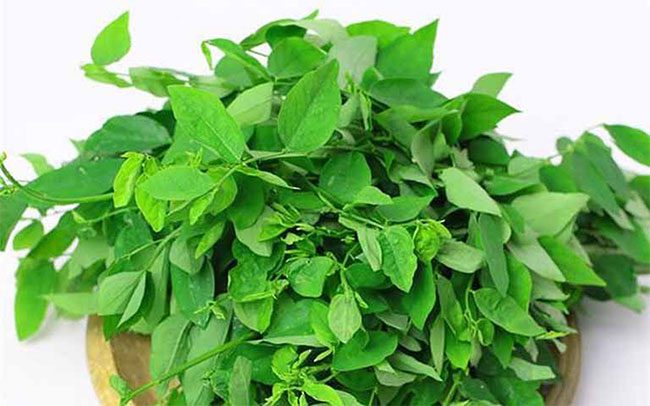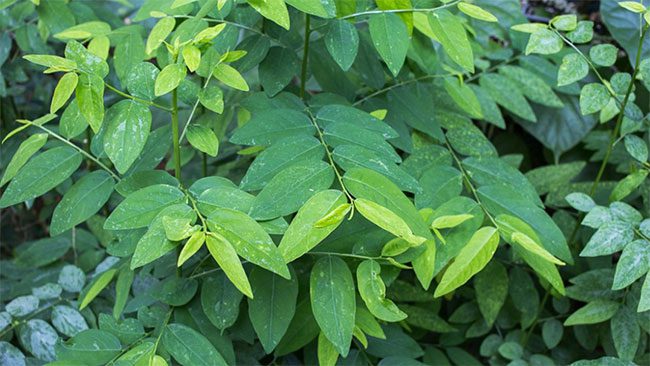Leaves of the bitter herb contain active compounds that can stimulate the production of testosterone hormones, enhancing men’s sexual health as well as the quality and quantity of sperm.
According to general practitioner Bui Hong Minh (former President of the Ba Dinh Traditional Medicine Association in Hanoi), in Traditional Medicine, bitter herb has a cool nature and a sweet taste, and when cooked, it loses some of its cold properties. Bitter herb leaves have diuretic effects, detoxification properties, and promote blood circulation.
Rich in Protein and Higher Vitamin C Content than Oranges and Guavas
Modern medical research shows that the protein content in bitter herb can be compared to that of well-known high-protein legumes, making it a rare and valuable plant protein. Moreover, the vitamin C content in bitter herb is even considered to be higher than that found in oranges or guavas.
In addition, Dr. Doan Hong – Nutrition Specialist at the Vietnam Institute of Applied Medicine – stated that bitter herb is high in carotenoids, which are precursors to vitamin A, especially in freshly harvested leaves, as well as high levels of vitamins B and C, proteins, and minerals such as vitamin C with 288% of the recommended daily intake in 100g of bitter herb and 23% for iron and 10% for zinc.

Leaves of the bitter herb contain active compounds that can stimulate testosterone hormone production.
Additionally, Dr. Doan Hong pointed out several other benefits of bitter herb. Firstly, it is known to increase breast milk production, which is why this vegetable is often recommended for postpartum women.
This is because bitter herb leaves contain estrogen, and this estrogen content provides hormonal effects that can activate more abundant breast milk production, making it very beneficial for breastfeeding mothers.
Notably, Dr. Doan Hong indicated that bitter herb improves sperm quality. Therefore, consuming bitter herb is highly encouraged for couples wishing to conceive soon, especially for men.
“This is due to the presence of active compounds (zinc, iron, etc.) in bitter herb that can stimulate testosterone hormone production to enhance men’s sexual health and improve the quality and quantity of sperm,” Dr. Doan Hong stated.
Compared to other vegetables, bitter herb is known for its high antioxidant content, including polyphenols and other antioxidants, which protect body cells from damage and inflammation caused by free radicals.
For bitter herb leaves, Dr. Doan Hong mentioned that the vitamin C content can help form collagen, an essential protein for skin cells to heal wounds. Regular consumption of bitter herb can significantly accelerate the healing process of the skin.
Ethanolic extracts found in bitter herb can prevent pneumonia and bacteremia caused by Klebsiella pneumonia and Staphylococcus aureus infections.
Typically, these two types of bacteria reside harmlessly in the human intestines and nose. However, under certain conditions, when their growth is uncontrolled and leads to infections, consuming bitter herb may assist in treatment.
Moreover, Dr. Doan Hong noted that a study showed bitter herb contains compounds that reduce the risk of diabetes, thus potentially lowering blood sugar levels in the body.
Like other green vegetables, bitter herb contains natural substances such as flavonoids, fiber, and water that can keep you feeling full for longer, thereby preventing overeating.
Additionally, consuming bitter herb allows you to manage your weight, as there is only 1g of fat in every 100g of bitter herb.
Thanks to its high β-carotene, a precursor to vitamin A, bitter herb helps prevent eye disorders and is particularly beneficial for eye health.
Should You Eat Bitter Herb Daily? Who Should Avoid It?
Although bitter herb has many health benefits, Dr. Doan Hong warns that some studies indicate that consuming too much dark green food can lead to side effects such as severe lung function decline. Additionally, excessive consumption of bitter herb may adversely affect health, causing insomnia, hindering calcium absorption, and loss of appetite.
“Therefore, you should not eat bitter herb daily. Instead, you should only consume a maximum of 50g of bitter herb per day and avoid continuous long-term consumption. Additionally, you should combine it with various other green vegetables for a balanced diet,” Dr. Doan Hong emphasized.

Pregnant women should absolutely avoid drinking raw bitter herb juice.
Furthermore, while beneficial for breastfeeding women, pregnant women should not consume this vegetable. Bitter herb contains a significant amount of papaverine, which helps relieve pain, lower blood pressure, and relax smooth muscle in blood vessels.
When consuming large amounts of bitter herb, the papaverine in the vegetable can increase uterine contractions, leading to miscarriage. Notably, raw bitter herb is even more toxic. Therefore, pregnant women should absolutely avoid drinking raw bitter herb juice.
Dr. Doan Hong also mentioned that many studies indicate that bitter herb can cause side effects such as shortness of breath, reduced appetite, and difficulty sleeping in some individuals, especially the elderly and those with weak health.
These side effects can be minimized through cooking, so individuals with a history of loss of appetite, insomnia, or the elderly should avoid drinking raw bitter herb juice. If consuming cooked bitter herb, it should only be in small amounts.
Additionally, despite the high calcium content in bitter herb, the presence of glucocorticoids in it can hinder the absorption of phosphorus and calcium in the body. Therefore, individuals with rickets, osteoporosis, or calcium deficiency should not consume large amounts of bitter herb.


















































